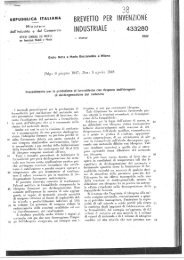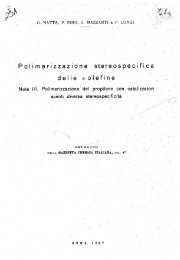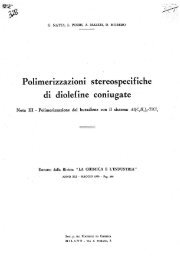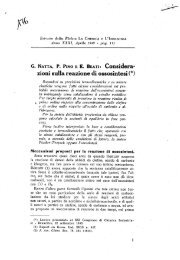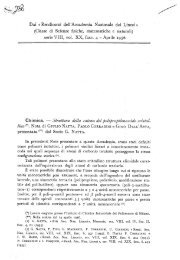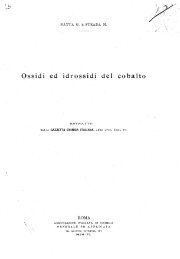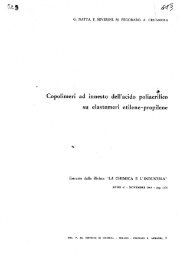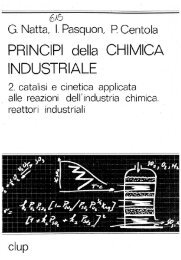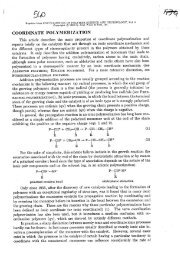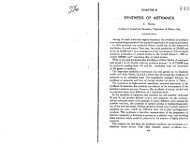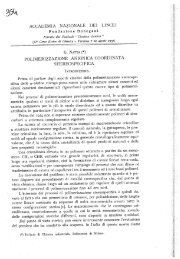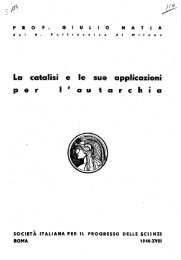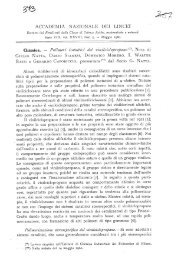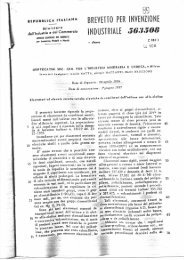n. 7, Ottobre 2003 - Giulio Natta
n. 7, Ottobre 2003 - Giulio Natta
n. 7, Ottobre 2003 - Giulio Natta
You also want an ePaper? Increase the reach of your titles
YUMPU automatically turns print PDFs into web optimized ePapers that Google loves.
Luciano Caglioti<br />
<strong>Natta</strong>-Giustiniani: una sinergia vincente<br />
<strong>Natta</strong>-Giustiniani: a winning sinergy<br />
Those who look at Italian policy with respect to<br />
research and innovation cannot but give a pessimistic<br />
judgment: a lot of brain-work, many ideas, but<br />
little application of those ideas in the country: just<br />
to make a few examples, Alessandro Volta, Antonio<br />
Pacinotti, Galileo Ferraris, Antonio Meucci,<br />
Guglielmo Marconi, Enrico Fermi gave life to industrial<br />
ventures which started from their ideas but<br />
were implemented and exploited in other countries.<br />
The case of <strong>Natta</strong> is an exception to this situation,<br />
which is not encouraging. And not just that, it<br />
is also an exception to that Italian habit (though it<br />
is not only Italian) which sees the poor collaboration<br />
between industrial research and public<br />
research. <strong>Natta</strong>’s scientific and industrial success<br />
came from the close collaboration between Milan<br />
Polytechnic and Montecatini, backed by the<br />
National Research Centre. In my mind, this story<br />
takes on the shapes of personal and family memories:<br />
there was a strong friendship between the two<br />
families, <strong>Natta</strong>’s and my father’s. <strong>Natta</strong> often came<br />
to Rome, often had lunch with us, sometimes together<br />
with the other key figure of that venture, ing.<br />
Giustiniani, managing director at Montecatini. A<br />
peculiar detail: I happened to be in Rome (I worked<br />
at the Milan Polytechnic) at my parents’ home,<br />
and I received a call from the Swedish embassy that<br />
requested the telephone number of prof. <strong>Natta</strong>. In<br />
turn, I asked if I had well understood the reason,<br />
and the silence / little laugh from my counterpart<br />
sounded like a silence / consent.<br />
The Nobel prize came, this unique award, and prof<br />
<strong>Natta</strong> himself, while the Polytechnic celebrated<br />
Chi guarda alla politica italiana in materia di ricerca<br />
e di innovazione è costretto ad un giudizio pessimistico:<br />
molto cervello, molte idee, ma poco sfruttamento<br />
di queste idee in patria: per fare qualche<br />
esempio, Alessandro Volta, Antonio Pacinotti,<br />
Galileo Ferraris, Antonio Meucci, Guglielmo<br />
Marconi, Enrico Fermi diedero vita ad avventure<br />
industriali che partirono dalle loro idee, ma che<br />
furono realizzate e sfruttate in altri paesi. Il caso di<br />
<strong>Natta</strong> costituisce una eccezione a questa non incoraggiante<br />
realtà. Non solo, ma esso costituisce una<br />
eccezione anche a quella abitudine italiana (anche<br />
se non solo italiana) che vede scarsa collaborazione<br />
fra ricerca industriale e ricerca pubblica. Il successo<br />
scientifico ed industriale di <strong>Natta</strong> provenne infatti<br />
da una stretta collaborazione fra il Politecnico di<br />
Milano e la Montecatini, con l’appoggio del CNR.<br />
Nella mia mente, la vicenda assume i contorni dei<br />
ricordi personali e familiari: vi era una forte amicizia<br />
fra le due famiglie, quella di <strong>Natta</strong> e quella di<br />
mio padre. <strong>Natta</strong> veniva spesso a Roma, era spesso<br />
a colazione da noi, talvolta insieme all’altro protagonista<br />
dell’avventura, l’Ingegner Piero Giustiniani,<br />
amministratore delegato della Montecatini. Un particolare<br />
speciale: ero a Roma per caso (lavoravo<br />
infatti al Politecnico di Milano, a casa dei miei genitori,<br />
e raccolsi una telefonata dell’ambasciata svedese<br />
che chiedeva il numero telefonico del Professor<br />
<strong>Natta</strong>. A mia volta chiesi se avevo ben capito il<br />
motivo, e il silenzio / risatina dell’interlocutrice<br />
suonò come un silenzio – assenso.<br />
Venne il Nobel, venne questo riconoscimento<br />
unico, e lo stesso Professor <strong>Natta</strong>, mentre il<br />
Politecnico lo festeggiava, disse che “senza la collaborazione<br />
fra il Politecnico e la Montecatini l’impresa<br />
non sarebbe stata possibile”. E vale la pena di<br />
riandare all’altro protagonista, a Giustiniani, che<br />
andai a trovare anni dopo per preparare un articolo<br />
sulla chimica italiana da pubblicare su “Il Giorno”.<br />
Era la primavera dell’ ‘81, le lotte erano da tempo<br />
finite, e le passioni spente. “Il bello per l'industria<br />
italiana fu tra il ‘50 e il ‘60. Si sviluppò al massimo<br />
l’impresa Montecatini, che Donegani aveva fondato<br />
e che io avevo preso in mano, durante la guerra,<br />
alla sua scomparsa. I tedeschi mi misero in galera.<br />
Ci rimasi due mesi. Difendevo gli impianti di San<br />
Giuseppe. Quando nel ‘50 dalla Terni tornai alla<br />
Montecatini, si svolgevano le stesse produzioni di<br />
prima della guerra, meno gli esplosivi che erano<br />
finiti con il conflitto. Si facevano acido solforico,<br />
fertilizzanti, tessili, minerali. Non si parlava del<br />
him, said that “without the collaboration between<br />
the Polytechnic and Montecatini this enterprise<br />
would not have been possible”. And it is worth<br />
mentioning the other character Giustiniani, whom<br />
I met years later to prepare an article on Italian<br />
chemistry to publish in the newspaper “Il giorno”.<br />
It was spring 1981, fights had been over for a long<br />
time, and passions were vanished. “The beautiful<br />
season of Italian industry was between 1950 and<br />
1960. There was the maximum development of the<br />
company Montecatini, which Donegani had set up<br />
and I had taken in my hands, during the war, after<br />
his passing away. Germans put me in jail. I remained<br />
there for two months. I defended San Giuseppe<br />
plants. When in 1950 I came back from the company<br />
Terni to Montecatini, it was producing the<br />
same things as before the war, minus explosives,<br />
which had finished with the war. We made sulphuric<br />
acid, fertilisers, textiles, minerals. We did not<br />
talk about the future, about polymers, and some<br />
wanted to contract out this field to ANIC (set up in<br />
1935 by Montecatini and Agip). We had the production<br />
of synthetic rubber from alcohol, under<br />
German licence, during the war there were some<br />
operations regarding polymers. In 1938, in Cesano<br />
Maderno, with <strong>Natta</strong>, we produced 50 tons per<br />
month of polyvinyl chloride, again under German<br />
licence. We ranked second in the world, after the<br />
Germans. Its cost was ITL 6 per kg, and we sold it<br />
at 12. <strong>Natta</strong>’s name appears in the story, and I asked<br />
how the <strong>Natta</strong>-Giustiniani combination was created,<br />
which led to polypropylene and then to the<br />
Nobel prize. “<strong>Natta</strong> worked as a consultant for<br />
Terni, with me, between 1945 and 1950. We made<br />
calcium carbide, we wanted to make rubber from<br />
acetyl. In July 1947 <strong>Natta</strong> and I left for the U.S., and<br />
we went all over the place for two months. We saw<br />
olefins plants: it was already petrochemical<br />
industry”. And so Giustiniani saw, and he was telling<br />
me now, the great acetyl-ethylene development:<br />
from calcium carbide, a precursor to acetyl,<br />
to cracking. From coal – a precursor of carbide – to<br />
raw oil, precursor of ethylene. Chemistry was witnessing<br />
the same change that had occurred in<br />
energy: coal was leaving to oil the main role it had<br />
played until the end of the war. “In 1950 I went to<br />
Montecatini. <strong>Natta</strong> followed me as a consultant. We<br />
had a first cracking plant in Ferrara. Acetyl chemistry<br />
had made way to ethylene chemistry. <strong>Natta</strong><br />
went to Essen to a conference held by Ziegler. He<br />
came back very impressed and convinced me to<br />
1.<br />
Con due suoi<br />
collaboratori (1957)<br />
With two<br />
collaborators (1957)<br />
futuro, dei polimeri, e si voleva appaltare questo<br />
settore all’ANIC (creata nel ‘35 da Montecatini ed<br />
Agip). Avevamo una produzione di gomma sintetica<br />
da alcool, su licenza tedesca, durante la guerra,<br />
c’era qualche attività sui polimeri. Nel ‘38, a Cesano<br />
Maderno, con <strong>Natta</strong>, si producevano 50 tonnellate<br />
al mese di cloruro di polivinile, ancora su licenza<br />
tedesca. Eravamo i secondi al mondo, dopo i tedeschi.<br />
Costava 6 lire al chilo, lo vendevamo a 12.”<br />
Compare nel discorso il nome di <strong>Natta</strong>, e chiedo<br />
come nacque il binomio <strong>Natta</strong>-Giustiniani che<br />
portò al polipropilene e quindi al Nobel. “<strong>Natta</strong> era<br />
consulente della Terni, con me, fra il ‘45 ed il ‘50.<br />
Facevamo carburo di calcio, volevamo fare gomma<br />
da acetilene. Nel luglio del ‘47 <strong>Natta</strong> ed io partimmo<br />
per gli USA, e girammo in lungo ed in largo<br />
per due mesi. Vedemmo gli impianti di olefine: era<br />
già petrolchimica”. E così Giustiniani vide, ed ora<br />
mi raccontava, la grande svolta acetilene - etilene:<br />
dal carburo di calcio, precursore dell'acetilene, si<br />
passa al cracking. Dal carbone - precursore del carburo<br />
- si passa al greggio, precursore dell'etilene. Si<br />
verificava nella chimica la stessa svolta che si era<br />
verificata nell’energia: il carbone cedeva al petrolio<br />
il ruolo di protagonista che aveva avuto fino alla<br />
62<br />
63



